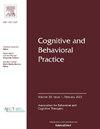认知加工疗法在受伤后创伤后应激障碍中的应用:案例研究
IF 2.9
3区 心理学
Q1 PSYCHOLOGY, CLINICAL
引用次数: 0
摘要
大约三分之一的创伤患者会在受伤后一年内经历创伤后应激障碍(PTSD)和/或抑郁症。在许多情况下,创伤性伤害的性质本身就构成创伤性事件。创伤性损伤之后往往伴随着随后的潜在创伤性医疗事件(即医疗创伤),这可能是损伤后恢复的特征。在传统的心理健康环境中,充分解决创伤患者复杂的生物心理社会需求可能具有挑战性。本案例研究的目的是为心理健康专业人员提供额外的指导,以满足创伤损伤患者的需求,包括同时治疗创伤相关症状和可能引发创伤线索的身体恢复方面的策略。具体而言,本案例研究为临床医生提供了创伤后应激障碍的概念化和治疗指导,特别关注医疗创伤应激反应(即与住院、康复和适应伤害/残疾相关的痛苦)。为了证明认知加工疗法在创伤后创伤后应激障碍中的临床应用,我们将重点放在一个虚构患者的经历和治疗考虑上,他代表了作者在临床实践中遇到的患者的融合。讨论了今后治疗创伤性应激的临床实践和研究方向。本文章由计算机程序翻译,如有差异,请以英文原文为准。
Applications of Cognitive Processing Therapy to Post-Injury PTSD: A Case Study
Approximately one in three traumatically injured patients will go on to experience post-injury posttraumatic stress disorder (PTSD) and/or depression within a year of injury. In many cases, the nature of a traumatic injury itself constitutes a traumatic event. Traumatic injuries are often followed by subsequent potentially traumatic medical events (i.e., medical trauma) that may characterize post-injury recovery. Adequately addressing the complex biopsychosocial needs of traumatically injured patients in a traditional mental health setting can be challenging. The goal of this case study is to provide mental health professionals additional guidance to meet the needs of traumatically injured patients, including strategies to concurrently treat trauma-related symptoms and aspects of physical recovery that can elicit trauma cues. Specifically, this case study provides guidance to clinicians on the conceptualization and treatment of post-injury PTSD, with a specific focus on medical traumatic stress reactions (i.e., distress related to hospitalization, recovery, and adjustment to injury/disability). To demonstrate clinical considerations and applications of Cognitive Processing Therapy to post-injury PTSD, we focus on the experiences and treatment considerations of a fictional patient who represents an amalgamation of patients the authors have encountered in their clinical practice. Future directions for clinical practice and research to address medical traumatic stress are also discussed.
求助全文
通过发布文献求助,成功后即可免费获取论文全文。
去求助
来源期刊

Cognitive and Behavioral Practice
PSYCHOLOGY, CLINICAL-
CiteScore
4.80
自引率
3.40%
发文量
118
审稿时长
84 days
期刊介绍:
Cognitive and Behavioral Practice is a quarterly international journal that serves an enduring resource for empirically informed methods of clinical practice. Its mission is to bridge the gap between published research and the actual clinical practice of cognitive behavior therapy. Cognitive and Behavioral Practice publishes clinically rich accounts of innovative assessment and diagnostic and therapeutic procedures that are clearly grounded in empirical research. A focus on application and implementation of procedures is maintained.
 求助内容:
求助内容: 应助结果提醒方式:
应助结果提醒方式:


